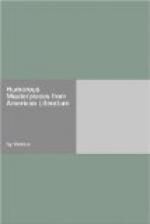“Our lazy life during the hot weather had become a little monotonous. The Arcadian plan had worked tolerably well, on the whole, for there was very little for any one to do,—Mrs. Shelldrake and Perkins Brown excepted. Our conversation, however, lacked spirit and variety. We were, perhaps unconsciously, a little tired of hearing and assenting to the same sentiments. But, one evening, about this time, Hollins struck upon a variation, the consequences of which he little foresaw. We had been reading one of Bulwer’s works, (the weather was too hot for Psychology,) and came upon this paragraph, or something like it:—
“’Ah, Behind the Veil! We see the summer smile of the Earth,—enamelled meadow and limpid stream,—but what hides she in her sunless heart? Caverns of serpents, or grottoes of priceless gems? Youth, whose soul sits on thy countenance, thyself wearing no mask, strive not to lift the masks of others! Be content with what thou seest; and wait until Time and Experience shall teach thee to find jealousy behind the sweet smile, and hatred under the honeyed word!’
“This seemed to us a dark and bitter reflection but one or another of us recalled some illustration of human hypocrisy, and the evidences, by the simple fact of repetition, gradually led to a division of opinion,—Rollins, Shelldrake, and Miss Ringtop on the dark side, and the rest of us on the bright. The last, however, contented herself with quoting from her favorite poet Gamaliel J. Gawthrop:—
“’I look beyond thy brow’s
concealment!
I see thy spirit’s dark revealment!
Thy inner self betrayed I see:
Thy coward, craven, shivering me!’
“‘We think we know one another,’ exclaimed Rollins; ’but do we? We see the faults of others, their weaknesses, their disagreeable qualities, and we keep silent. How much we should gain, were candor as universal as concealment Then each one, seeing himself as others see him, would truly know himself. How much misunderstanding might be avoided, how much hidden shame be removed, hopeless because unspoken love made glad, honest admiration cheer its object, uttered sympathy mitigate misfortune,—in short, how much brighter and happier the world would become, if each one expressed, everywhere and at all times, his true and entire feeling! Why, even Evil would lose half its power!’




